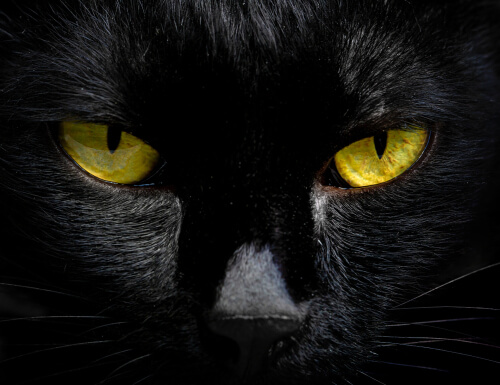9 Curiosities About the Nocturnal Cat


Written and verified by the biologist Cesar Paul Gonzalez Gonzalez
If you have cats, it’s likely that you have had trouble getting them to sleep at night. This is linked to their predilection for nightlife, which makes them prefer to carry out their activities in the dark rather than during the day. Learn all about the nocturnal cat in this article.
Such behavior is closely related to their wild nature, so it’s sometimes difficult to deal with. Of course, the domestication process has provided them with the ability to adapt to the human schedule, although this also depends a lot on each individual cat. If you want to get to know some curiosities about the behavior of the nocturnal cat, continue reading!
Peculiar facts about the nocturnal cat
Although cats have long been part of human life, they still retain certain instincts and characteristics reminiscent of their wild ancestors. Therefore, it isn’t surprising that their sleep patterns may have certain conflicts. Get to know the most peculiar curiosities of a nocturnal cat.
1. They aren’t as nocturnal as they seem
Domestic felines come from a lineage that was characterized by being crepuscular. That is, they were active mainly in the hours before dawn and dusk. This versatility is what allows them to stay awake part of the day and coexist with their owners, although it’s also what makes it easier for them to become active during the night.
2. They took advantage of darkness to hunt their prey
One of the reasons why cats’ ancestors were crepuscular is because darkness allowed them to catch their prey easily. In this way, they used the low lighting to their advantage and improved the success rate of their hunt.
3. They’re able to modify their schedules
As mentioned above, not all cats tend to exhibit nocturnal behavior, as some have adapted to live with the schedules of their owners. This is only possible because, in the wild, domestic felines also adapted to the activity pattern of their prey. Thanks to this, a nocturnal cat can still be trained to improve its habits and avoid sleepless nights.
4. Cats are adapted for the night
Although they can adapt their activity pattern to almost any schedule, the biology of cats has great adaptations for a nocturnal life. For example, their eyes have a series of cells (tapetum lucidum) that reflect light and allow them to see better in the dark. In fact, this is the reason why their eyes glow if a beam of light is pointed directly into their eyes.

5. Some feral cats are nocturnal
Due to the irresponsibility of some owners, populations of nocturnal feral cats that live by themselves in the wild have formed in various parts of the world. These groups form from abandoned domestic cats, so they aren’t completely wild. However, they’re as close as you can get to a “wild” living lineage.
6. Cats sleep 16 hours a day
One of the most important aspects of the feline sleep cycle is that they sleep on average about 16 hours a day. Of course, they don’t sleep for very long periods like humans do, but in small lapses of about 4 hours, distributed throughout the day. In fact, thanks to this sleep pattern, cats can easily change their schedules.
7. Their nocturnal behavior isn’t always due to their habits
Something that’s essential to know is that a cat’s nocturnal habits aren’t always caused by a behavioral problem. In some cases, aches, pains, discomfort, and various illnesses can cause the feline not to sleep well. So, before trying to modify their behavior, consult a veterinarian to rule out any health problems.

8. They’ll maintain their habits as long as they perceive benefits
A nocturnal cat may find certain benefits if they maintain their habits. For example, if their owners pamper them or give them some reward to keep them quiet every time they wake up, then the cat will start repeating the action to keep getting the benefits.
This means that if you want to eliminate this behavior, you’ll have to start ignoring their actions so that they understand that they’re not going to benefit from these actions.
9. They can become very fussy
If you’ve had cats before, you’ve probably noticed that some of them can become quite fussy. So, they might avoid sleeping through the night because their bed is uncomfortable or because it’s too hot (or cold). What’s more, if they don’t like the area where they usually rest, they’re likely to avoid it and won’t change their mind until you change it.
Cats are one of the most peculiar pets you can have at home, as their temperament and character make them unique in every sense of the word. However, if you don’t take care of all aspects of their welfare, they’re likely to become a nocturnal cat and wreak havoc in your home!
If you have cats, it’s likely that you have had trouble getting them to sleep at night. This is linked to their predilection for nightlife, which makes them prefer to carry out their activities in the dark rather than during the day. Learn all about the nocturnal cat in this article.
Such behavior is closely related to their wild nature, so it’s sometimes difficult to deal with. Of course, the domestication process has provided them with the ability to adapt to the human schedule, although this also depends a lot on each individual cat. If you want to get to know some curiosities about the behavior of the nocturnal cat, continue reading!
Peculiar facts about the nocturnal cat
Although cats have long been part of human life, they still retain certain instincts and characteristics reminiscent of their wild ancestors. Therefore, it isn’t surprising that their sleep patterns may have certain conflicts. Get to know the most peculiar curiosities of a nocturnal cat.
1. They aren’t as nocturnal as they seem
Domestic felines come from a lineage that was characterized by being crepuscular. That is, they were active mainly in the hours before dawn and dusk. This versatility is what allows them to stay awake part of the day and coexist with their owners, although it’s also what makes it easier for them to become active during the night.
2. They took advantage of darkness to hunt their prey
One of the reasons why cats’ ancestors were crepuscular is because darkness allowed them to catch their prey easily. In this way, they used the low lighting to their advantage and improved the success rate of their hunt.
3. They’re able to modify their schedules
As mentioned above, not all cats tend to exhibit nocturnal behavior, as some have adapted to live with the schedules of their owners. This is only possible because, in the wild, domestic felines also adapted to the activity pattern of their prey. Thanks to this, a nocturnal cat can still be trained to improve its habits and avoid sleepless nights.
4. Cats are adapted for the night
Although they can adapt their activity pattern to almost any schedule, the biology of cats has great adaptations for a nocturnal life. For example, their eyes have a series of cells (tapetum lucidum) that reflect light and allow them to see better in the dark. In fact, this is the reason why their eyes glow if a beam of light is pointed directly into their eyes.

5. Some feral cats are nocturnal
Due to the irresponsibility of some owners, populations of nocturnal feral cats that live by themselves in the wild have formed in various parts of the world. These groups form from abandoned domestic cats, so they aren’t completely wild. However, they’re as close as you can get to a “wild” living lineage.
6. Cats sleep 16 hours a day
One of the most important aspects of the feline sleep cycle is that they sleep on average about 16 hours a day. Of course, they don’t sleep for very long periods like humans do, but in small lapses of about 4 hours, distributed throughout the day. In fact, thanks to this sleep pattern, cats can easily change their schedules.
7. Their nocturnal behavior isn’t always due to their habits
Something that’s essential to know is that a cat’s nocturnal habits aren’t always caused by a behavioral problem. In some cases, aches, pains, discomfort, and various illnesses can cause the feline not to sleep well. So, before trying to modify their behavior, consult a veterinarian to rule out any health problems.

8. They’ll maintain their habits as long as they perceive benefits
A nocturnal cat may find certain benefits if they maintain their habits. For example, if their owners pamper them or give them some reward to keep them quiet every time they wake up, then the cat will start repeating the action to keep getting the benefits.
This means that if you want to eliminate this behavior, you’ll have to start ignoring their actions so that they understand that they’re not going to benefit from these actions.
9. They can become very fussy
If you’ve had cats before, you’ve probably noticed that some of them can become quite fussy. So, they might avoid sleeping through the night because their bed is uncomfortable or because it’s too hot (or cold). What’s more, if they don’t like the area where they usually rest, they’re likely to avoid it and won’t change their mind until you change it.
Cats are one of the most peculiar pets you can have at home, as their temperament and character make them unique in every sense of the word. However, if you don’t take care of all aspects of their welfare, they’re likely to become a nocturnal cat and wreak havoc in your home!
All cited sources were thoroughly reviewed by our team to ensure their quality, reliability, currency, and validity. The bibliography of this article was considered reliable and of academic or scientific accuracy.
- CATS PROTECTION (2015). Essential Guide: Understanding your cat’s behaviour. Recuperado el 3 de mayo de 2022, disponible en: https://www.cats.org.uk/media/1020/eg09_understanding_your_cats_behaviour.pdf
- Ursin, R., Moses, J., Paul, N., & Johnson, L. C. (1983). REM-NREM cycle in the cat may be sleep-dependent. Sleep, 6(1), 1-9.
- Díaz, A. (2018) Gatos Ferales: ¿Qué son y cómo ayudarlos?. (Tesis de Grado, Universidad Autónoma Metropolintana).
- Cruz-Reyes, A. (2009). Fauna feral, fauna nociva y zoonosis. Biodiversidad del ecosistema del Pedregal de San Angel. Sección: restauración, conservación y manejo, 453-461.
This text is provided for informational purposes only and does not replace consultation with a professional. If in doubt, consult your specialist.








